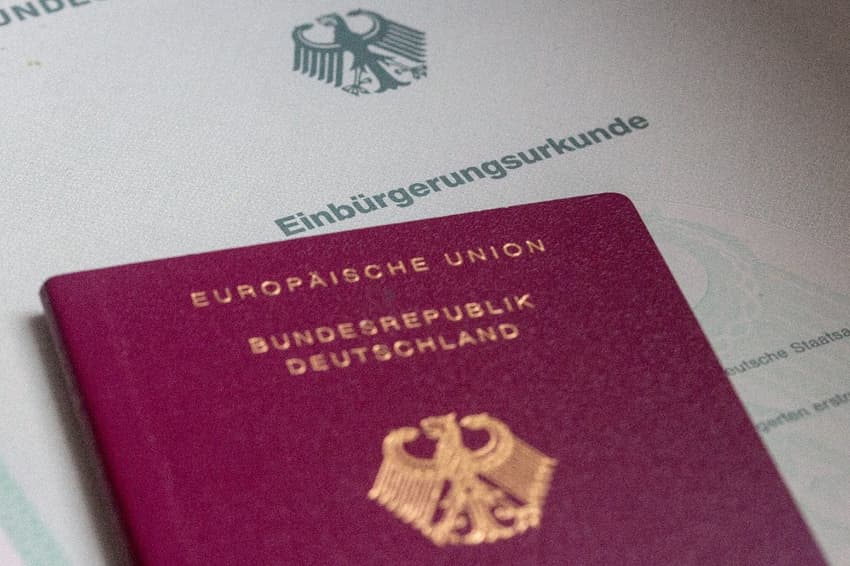When might Germany's dual citizenship law get final signature?

Many foreigners in Germany eagerly anticipating the country's upcoming citizenship reform law - which would allow dual nationality - are waiting through yet another delay. So when might the reform finally clear its last hurdle?
It's been a frustrating few years for many foreigners in Germany, who've been left with little news as a draft law allowing dual citizenship passed both parliamentary chambers - the Bundestag and Bundesrat - well over a month ago.
The legislation, which would also reduce the time someone needs to have been resident in Germany before applying for citizenship from eight years to five, has been delayed numerous times since the country's ruling traffic light coalition agreed to liberalise nationality laws in late 2021.
With the Bundestag having finally passed the law on January 19th and the Bundesrat following suit on February 2nd, the only thing standing in the way of the new rules coming into effect in spring was the Federal President's final signature.
READ ALSO: What are the next steps for Germany's new dual citizenship law?
Unfortunately, as of March 15th, 2024 - the government had yet to submit the final draft legislation to the Federal President for constitutional review. German governments normally countersign draft legislation even after it passes parliament - and the new nationality law has sat in government offices ever since.
"The Federal Office of Justice first has to create the final, edited version of the law. This took some time, but there are no constitutional concerns or other obstacles," explained Hakan Demir, the Social Democrat (SPD) rapporteur for the new law in the Bundestag, on parliamentary watchdog site Abgeordnetenwatch.
"The final version of the law, has now been completed and the signature of the responsible members of the federal government and the federal president will take place shortly."
READ ALSO: Has Germany's upcoming dual citizenship law been delayed again?
What happens once the law reaches the President's office? What about after he signs it?
Once the law reaches the President's office, staffers there do a constitutional review to make sure it is in line with the German Basic Law. This is typically a formality but does take a bit of time.
Sources at the Federal President's office say two weeks is fairly normal, although any particular law can sometimes take longer - or even proceed ahead faster than normally expected. So it's hard to know for certain.

German President Frank Walter Steinmeier (SPD) has a largely ceremonial role in German politics, but will still need to do a constitutional review of the new citizenship law. Photo picture alliance/dpa | Bernd von Jutrczenka
Once the Federal President does sign off, civil servants will go through an implementation phase to put the new rules in place. The new law specifically provides for this period to be exactly three months, so we will know the precise date the new rules come in effect once the President signs the law. At that point, the three-month countdown starts.
When should people apply?
Those who have been in Germany for at least five years but less than eight years have no choice but to wait until the new rules come into effect before filing their application. They can, however, start preparing their documents and taking language tests, for example.
Those who have been here for more than eight years have had to carefully consider the timing of their applications, trying to beat the lines of new foreigners expected to apply while making sure that they can take citizenship after the new law comes into effect - thus retaining their original nationality.
For these people in particular, the delays have been frustrating, with more expected once already backlogged authorities actually have to process newly eligible applicants.
"It's important that the law is implemented throughout Germany by well-prepared, well-equipped, and increasingly digitalized administrations," Demir added.
READ ALSO: 'I've waited four years': Foreigners in Berlin furious over German citizenship delays
Comments (1)
See Also
It's been a frustrating few years for many foreigners in Germany, who've been left with little news as a draft law allowing dual citizenship passed both parliamentary chambers - the Bundestag and Bundesrat - well over a month ago.
The legislation, which would also reduce the time someone needs to have been resident in Germany before applying for citizenship from eight years to five, has been delayed numerous times since the country's ruling traffic light coalition agreed to liberalise nationality laws in late 2021.
With the Bundestag having finally passed the law on January 19th and the Bundesrat following suit on February 2nd, the only thing standing in the way of the new rules coming into effect in spring was the Federal President's final signature.
READ ALSO: What are the next steps for Germany's new dual citizenship law?
Unfortunately, as of March 15th, 2024 - the government had yet to submit the final draft legislation to the Federal President for constitutional review. German governments normally countersign draft legislation even after it passes parliament - and the new nationality law has sat in government offices ever since.
"The Federal Office of Justice first has to create the final, edited version of the law. This took some time, but there are no constitutional concerns or other obstacles," explained Hakan Demir, the Social Democrat (SPD) rapporteur for the new law in the Bundestag, on parliamentary watchdog site Abgeordnetenwatch.
"The final version of the law, has now been completed and the signature of the responsible members of the federal government and the federal president will take place shortly."
READ ALSO: Has Germany's upcoming dual citizenship law been delayed again?
What happens once the law reaches the President's office? What about after he signs it?
Once the law reaches the President's office, staffers there do a constitutional review to make sure it is in line with the German Basic Law. This is typically a formality but does take a bit of time.
Sources at the Federal President's office say two weeks is fairly normal, although any particular law can sometimes take longer - or even proceed ahead faster than normally expected. So it's hard to know for certain.

Once the Federal President does sign off, civil servants will go through an implementation phase to put the new rules in place. The new law specifically provides for this period to be exactly three months, so we will know the precise date the new rules come in effect once the President signs the law. At that point, the three-month countdown starts.
When should people apply?
Those who have been in Germany for at least five years but less than eight years have no choice but to wait until the new rules come into effect before filing their application. They can, however, start preparing their documents and taking language tests, for example.
Those who have been here for more than eight years have had to carefully consider the timing of their applications, trying to beat the lines of new foreigners expected to apply while making sure that they can take citizenship after the new law comes into effect - thus retaining their original nationality.
For these people in particular, the delays have been frustrating, with more expected once already backlogged authorities actually have to process newly eligible applicants.
"It's important that the law is implemented throughout Germany by well-prepared, well-equipped, and increasingly digitalized administrations," Demir added.
READ ALSO: 'I've waited four years': Foreigners in Berlin furious over German citizenship delays
Join the conversation in our comments section below. Share your own views and experience and if you have a question or suggestion for our journalists then email us at [email protected].
Please keep comments civil, constructive and on topic – and make sure to read our terms of use before getting involved.
Please log in here to leave a comment.